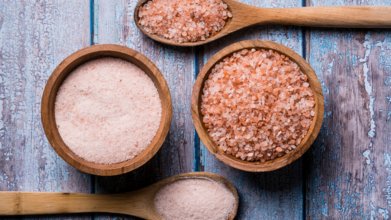- Health Conditions A-Z
- Health & Wellness
- Nutrition
- Fitness
- Health News
- Ayurveda
- Videos
- Medicine A-Z
- Parenting
Is Pink Salt Weight Loss An Ancient Ayurvedic Ritual Or AI-Fueled Fad Trend?

(Credit-Canva)
It is not new for weight loss trends to pop up, whether it is intermittent fasting, quitting carbs, ‘three-bite-rule’ etc. However, recently a new diet trend has gotten the attention of many people throughout the world, but not for the right reasons.
The ‘Pink Salt Diet Trend’ has seen an instant rise on the internet, however, what is actually fueling this rise? Does it actually work or is its false advertising?
Is Pink Salt An Ayurvedic Remedy?
According to Freedom from Diabetes organization, Himalayan pink salt, , also known as sendha namak, is often seen as a healthier alternative to regular table salt or sea salt. It's believed to be a better choice not only because of its mineral content but also because it contains slightly less sodium chloride than common table salt.
This salt comes from the Himalayan mountains and gets its signature pink color from trace amounts of minerals like magnesium, potassium, and calcium. It's often promoted as the purest form of salt because it is said to be free of chemicals. However, many experts have pointed out a key detail about these benefits. Not only is there not enough evidence of its benefits, they are also few and far between, meaning it isn’t too different from regular iodized salt.
Myth vs Reality: Is Pink Salt Actually Healthy?
It has been a few year since we have seen the slow rise of pink salt. Iodine Global Network experts pointed out that the salt is surrounded by myths. Despite its name, the salt doesn’t come from the Himalayas. It is actually mined from deep underground deposits in Pakistan. The pink color, often marketed as a sign of its health benefits, is simply due to small amounts of other minerals, which offer no real nutritional advantage.
Claims that pink salt can detoxify the body or that lamps made from it can purify the air are also false. The tiny amounts of trace minerals present are not enough to have any effect on health. A study by Australian scientists found that you would need to consume about six teaspoons of pink salt a day to get any significant nutrients from it—an amount that would be dangerously high in sodium and bad for your health.
Was The ‘Pink Salt Trick’ A Wellness Hack Or Scam?
On social media, "pink salt trick" is being heavily promoted, often using fake videos created with artificial intelligence (AI). These videos, some of which feature fake versions of celebrities like Oprah Winfrey, claim that a simple drink can "melt fat," "reset metabolism," and is "better than Ozempic." In reality, these are scams, and celebrities like Oprah have never endorsed them. The videos spread false health information.
The "pink salt" recipe is very simple, which is why it has become so popular: you just mix a half teaspoon of pink salt and the juice of half a lemon into a glass of water. The videos claim this drink is an easy way to lose weight.
However, there is no scientific evidence to support these claims. No studies have shown that this drink can cause weight loss or reduce appetite.
Experts, including nutritionists, have warned against this trend. They explain that the high salt content in the drink can actually cause water retention and bloating, rather than fat loss. Also, if people use pink salt instead of regular table salt, they risk not getting enough iodine, which can lead to thyroid problems.
Is The Pink Salt Trick Banking On The ‘Quick Weight Loss’ Scheme?
The truth about social media is that one thing that will always trend is the newest diet or the newest way to lose weight. It is also true that the moment it gains momentum, the trend will have hundreds if not thousands of people doing tricks or hacks to lose weight. While some may be doing it to see whether it works or not, others may do it because they are not happy with their weight and struggling to lose it.
This is why one must stay alert and fact check any claims with a healthcare professional, because your health comes first.
What Salt Should We Use: Pink Or Regular Iodized Salt?
The widespread use of iodized salt has been incredibly successful in reducing iodine deficiency worldwide. The International Council for the Control of Iodine Deficiency Disorders (IGN) works with governments and industries to make sure salt iodization programs continue, protecting public health and, most importantly, children’s brain development. As new trends like Himalayan pink salt emerge, it's important to prioritize health over hype and recognize that iodized salt remains a crucial part of a healthy diet.
Supreme Court Declares Menstrual Hygiene As Part Of Right To Life; Free Sanitary Pads For Girls In All Schools

Credits: Britannica and Canva
Supreme Court on Friday declared the right to menstrual health as part of the right to life under Article 21 of the Constitution. The court issued a slew of directions to ensure that every school provides biodegradable sanitary napkins free of cost to adolescent girls. The guidelines also ensured that schools must be equipped with functional and hygienic gender-segregated toilets. The Court directed the pan-India implementation of the Union's national policy, 'Menstrual Hygiene Policy for School-going Girls' in schools for adolescent girl children from Classes 6-12.
Read: Menopause Clinics Explained: Latest Launch By Maharashtra And Kerala Government
Supreme Court Declares Menstrual Hygiene As Part Of Right To Life: Here Are the Directions
A bench comprising Justice JB Pardiwala and Justice R Mahadevan passed the following directions:
- All States/UT must ensure that every school, whether government-run or privately managed, in both urban and rural areas, is provided with functional gender segregated toilets with usable water connectivity.
- All existing or newly constructed toilets in schools shall be designed, constructed and maintained to ensure privacy and accessibility, including by catering to needs of children with disabilities.
- All school toilets must be equipped with functional washing facilities and soap and water available at all times.
- All states/UTs must ensure that every school, whether government-run or privately managed, in both urban and rural areas, provide oxo-biodegradable sanitary napkins manufactured in compliance with the ASTM D-6954 standards free of cost. Such sanitary napkins must be made readily accessible to girl students, preferably within toilet premises through sanitary napkin vending machines or, where not visible, at a designated place.
- All States/UTs must ensure that every school, whether government-run or privately managed, in both urban and rural areas establish menstrual hygiene management corners. It must be equipped with spare innerwears, uniforms, disposable pads and other necessary materials to address menstrual urgency.
The court also issued directions for the disposal of sanitary waste. Justice Pardiwala said, "This pronouncement is not just for stakeholders of the legal system. It is also meant for classrooms where girls hesitate to ask for help. It is for teachers who want to help but are restrained due to a lack of resources. And it is for parents who may not realise the impact of their silence and for society to establish its progress as a measure in how we protect the most vulnerable. We wish to communicate to every girlchild who may have become a victim of absenteeism because her body was perceived as a burden when the fault is not hers."
Read: Menstrual Cups To Replace Sanitary Napkins In Karnataka Government Schools
Why Is This Judgment So Important?
In India, menstruation is still seen as taboo. In fact, there is a lot of shame around it. Menstrual shame is the deeply internalized stigma, embarrassment, and negative perception surrounding menstruation, which causes individuals to feel unclean, or "less than" for a natural biological process. This judgment thus is an effort to do away with the shame rooted in cultural, social, and religious taboos, which is often the reason why many girls drop out, or due to lack of awareness, develop health adversities.
Most Medical Videos Even By Doctors Online Are Factually Incorrect, Finds Study

Representational Image by iStock
Most health videos on YouTube, even those made by doctors are also not reliable medical information, found a new study, published in JAMA Network Open. The researchers reviewed 309 popular YouTube videos on cancer and diabetes and found that fewer than 1 in 5 were supported by high quality scientific evidence. About two-thirds of the view had low, very low or no evidence at all to back up their health claims.
What was more concerning is that weaker evidence often attracted more viewer than those backed with strong science. The study looked at videos which had at least 10,000 views. The lead author of the study Dr EunKyo Kang of South Korea's National Cancer Center, said, "This reveals a substantial credibility-evidence gap in medical content videos, where physician authority frequently legitimizes claims lacking robust empirical support."
"Our findings underscore the necessity for evidence-based content-creation guidelines, enhanced science communication training for health care professionals, and algorithmic reforms prioritizing scientific rigor alongside engagement metrics," Kang added in a news release.
How Was The Study Conducted?
The researchers reviewed videos from June 20 and 21, 2025, focusing on cancer and diabetes content. 75 per cent of them were made by physicians. The videos had a median count of 164,000 views and a median length of 19 minutes.
Researchers also developed a scoring system, called E-GRADE to rate the strength of science backed evidence in each video's claim.
This is how the grading system worked:
- GRADE A: high quality evidence
- GRADE B: standard quality evidence
- GRADE C: low quality evidence
- GRADE D: very low or no evidence
What Were The Results Of The Medical Videos?
- GRADE A: 19.7%
- GRABE B: 14.6%
- GRADE C: 3.2%
- GRADE D: 62.5%
The study also found that videos with the weakest evidence were 35% more likely to get higher views than videos with strong scientific evidence.
Richard Saver, a professor of law at the University of North Carolina at Chapel Hill noted that this issue is not just limited to YouTube. "Physician-spread misinformation is a long-standing problem, dating back well before the internet era," he wrote in an accompanying editorial.
Saver said some doctors continue to lean on personal experience rather than solid data, despite evidence-based medicine being regarded as the gold standard. He noted that EBM can feel like it downplays individual clinical judgment. Still, Saver stressed that more research is needed, adding that the study underscores the importance of examining the evidence behind health professionals’ claims on social media.
How Health And Me Has Helped With Medical Facts
Health and Me has always stayed a step ahead from medical misinformation and ensured that its readers too consume correct information. Health and Me's Fact Check series have consistently ran checks on bizarre medical claims, whether it is about a magical potion for weight loss, fake health news, or un-scientific remedies.
Fact Check By Health And Me:
- Fact Check: Does Circumcision Really Cause Autism As Claimed By RFK Jr.?
- Fact Check: Semen Production Means You Have Healthy Sperms, Here's What The Doctor Says
- Fact Check: Is The COVID-19 'Lab Leak' Theory Correct?
- Fact Check: Are Fewer Childhood Vaccines Really “A Better Thing” Under the New CDC Guidelines?
- Fact Check: Is Weight Lifting Safe for Teens? An Expert Explains the Risks and Safer Alternatives
- Fact Check: Do Heart Attacks Peak in the Early Morning? Here’s What a Doctor Says
- Fact Check: Does Ja Morant Have Lung Cancer?
- Fact Check: Can Cold Morning Showers Trigger Brain Stroke?
- Fact Check: Is The Pink Salt Trick Recipe Effective For Weight Loss?
Menopause Clinics Explained: Latest Launch By Maharashtra And Kerala Government

Credits: Canva
The World Health Organization (WHO) noted that menopause often goes unnoticed as a clinical priority, observing these unmet needs, the state governments in Maharashtra and Kerala will soon launch government-run menopause clinics. These clinics will have specialized support systems designed to offer holistic healthcare services for menopausal women within the public system.
These clinics will also have medical consultations, mental health counselling, targeted screening services and lifestyle guidance.
What Are Menopause Clinics?
Menopause clinics are specialized healthcare units, usually housed in government hospitals, urban health centres or district hospitals, that focus on both the medical and emotional needs of women transitioning through menopause. Rather than brushing menopause aside as a “natural” phase that needs little attention, these clinics offer organized, evidence-based care that goes well beyond routine outpatient visits.
At the heart of a menopause clinic is a comprehensive, integrated approach that includes:
- Clinical assessment of menopausal symptoms
- Screening for hormonal and physical health issues, such as bone health and heart disease risk
- Mental health support and psychosocial counselling
- Personalized advice on lifestyle, nutrition and mid-life wellness
- Ongoing patient education and structured follow-up
By bringing these services together under one roof, menopause clinics help women cope with day-to-day symptoms while also addressing long-term risks like osteoporosis, metabolic changes and a higher likelihood of cardiovascular disease.
What Is Menopause?
This is the natural, permanent end of menstruation defined as 12 consecutive months without a period. This typically occurs between ages 45 to 55.
Foods That May Help During Menopause
- Soy: A top source of phytoestrogens, particularly isoflavones, which bind to estrogen receptors in your body. Studies suggest soy may help alleviate hot flashes, improve cholesterol levels, and even reduce the risk of heart disease during menopause.
- Flaxseed: Packed with lignans, a type of phytoestrogen with mild estrogenic effects, flaxseed may also offer some relief.
Including these foods in your diet could help ease symptoms and reduce your risk of certain menopause-related conditions.
Why a Balanced Diet Matters
A nutrient-packed, balanced diet is the foundation of good health at any age. Prioritize:
- Vegetables and fruits: Rich in vitamins and antioxidants.
- Whole grains: Great for maintaining steady blood sugar levels.
- Lean proteins: Support muscle health and repair.
- Low-fat dairy: Provides calcium for bone strength.
- Avoid ultra-processed junk foods, excessive sugar, and unhealthy fats, which contribute little beyond empty calories.
Maharashtra Menopause Clinic
Earlier this January, the Maharashtra government rolled out the country’s first state-run menopause clinics across government hospitals and urban health facilities. The initiative was launched on Makar Sankranti, January 14, under the guidance of Minister of State for Health Meghna Bordikar.
As per official statements, these clinics are designed to offer end-to-end care in one place. Services include expert medical consultations to evaluate and manage menopausal symptoms, mental health support to address emotional and psychological concerns, and screenings for bone health, cardiovascular risk and hormonal balance. Medicines and follow-up advice are also provided during the same visit, cutting down the need for multiple referrals and repeat hospital trips.
A senior health official pointed out that while menopause is a natural life stage and not a disease, many women need consistent physical and emotional support during this transition. The strong response from women across Maharashtra highlights a long-standing gap in healthcare, where menopause-related concerns often went unaddressed due to the absence of dedicated services. With this move, Maharashtra has also set an example for other states looking to introduce gender-specific care within public health systems.
Read: Can Your Diet Affect Menopause?
Kerala follows with dedicated clinics
Taking a cue from Maharashtra, the Kerala government has announced plans to set up specialized menopause clinics in district hospitals. An initial allocation of Rs 3 crore has been earmarked for the project in the 2026 state budget, presented by Finance Minister K N Balagopal.
The proposed clinics in Kerala will follow a similar model, offering medical consultations for menopausal symptoms, mental health counselling, and screenings for heart, bone and hormonal health. Women will also receive medicines along with lifestyle and dietary advice at a single facility.
The initiative acknowledges the wide-ranging impact of menopause, including hormonal changes, sleep disturbances, bone health issues and increased stress, and aims to create a one-stop support system within district hospitals. By bringing menopause care into mainstream public healthcare, Kerala hopes to improve access, reduce stigma and ensure that women receive timely, structured support during this phase of life.
© 2024 Bennett, Coleman & Company Limited

